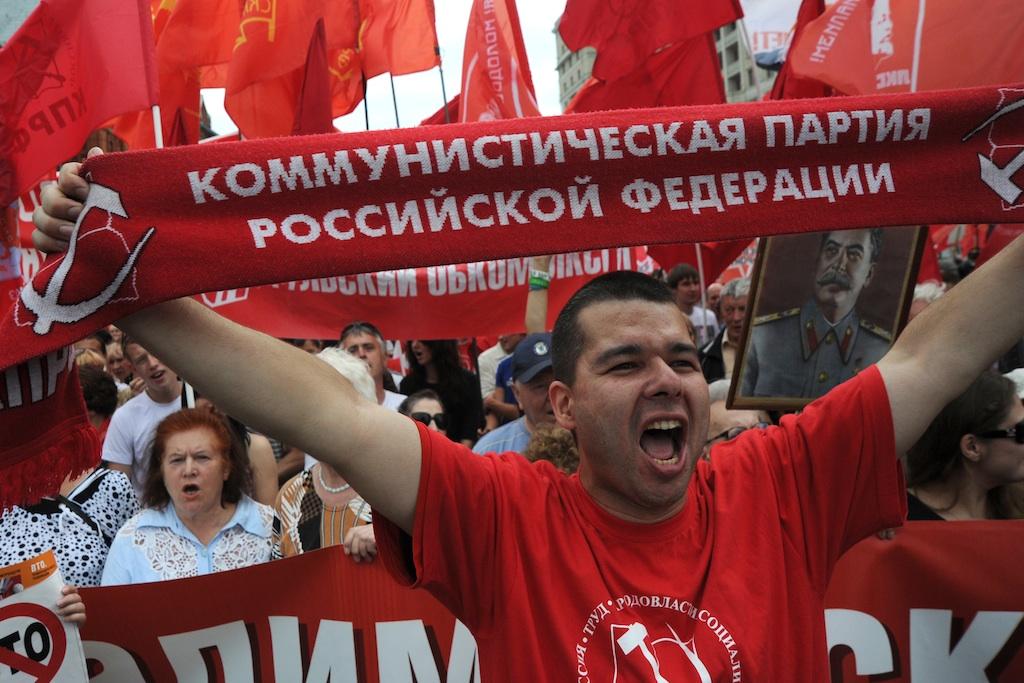Russia ratifies WTO membership
Communist Party supporters rally against Russia’s impending membership of the World Trade Organization just outside the Red Square in Moscow, on July 3, 2012.
MOSCOW, Russia – Russian lawmakers voted on Tuesday to ratify accession to the World Trade Organization, bringing the world's largest country into the club that sets global trade rules after a tortuous 18-year negotiating marathon.
The lower house vote, carried by a majority of 30 votes, seals Russia's entry to the WTO under a deal reached last December that will oblige Moscow to cut import tariffs and open up key sectors of its economy to foreign investment.
Russia's $1.9 trillion economy, the world's ninth largest, will officially become the WTO's 156th member 30 days after ratification.
President Vladimir Putin, elected in March for a third Kremlin term, had long appeared ambivalent about WTO entry but warmed to the process after Russia's economy was hit hard by the global recession of 2008-09.
Addressing the State Duma, Economy Minister Andrei Belousov said, although WTO entry carried risks, they would be outweighed by the benefits – in particular to consumers in terms of better choice, quality and prices for goods.
The reduction of import tariffs under the WTO deal, from an average 9.5 percent now to 6 percent by 2015, would happen no faster than in other new member states, giving firms time to invest in boosting their competitiveness, he said.
Failure to ratify accession in time would have forced Russia to renegotiate, Belousov said.
"We would not be able to get better terms than today and would lose years," he told the chamber.
PRESSURE ON WASHINGTON
In Washington, Trade Representative Ron Kirk urged U.S. lawmakers to quickly approve permanent normal trade relations, known as PNTR, with Russia by lifting a Cold War-era provision that made favorable U.S. tariffs conditional on the rights of Russian Jews to emigrate freely.
The Jackson-Vanik amendment is inconsistent with WTO rules requiring countries to provide equal treatment for imports from all other members, and also considered out of date.
If Congress fails to approve PNTR, Russia could deny U.S. exporters the market-opening concessions it made to join the WTO, putting them at a disadvantage to suppliers in Europe, Asia and elsewhere around the world.
"Russia's membership in the rules-based global trading system of the WTO will contribute to Russia's economic growth as well as provide us with new opportunities to guide and grow our bilateral economic relationship," Kirk said.
Senate Finance Committee Chairman Max Baucus, a Montana Democrat, has said he plans to push forward on a PNTR bill this month, but his counterpart in the House of Representatives, Ways and Means Committee Chairman Dave Camp, a Michigan Republican, has not made the same pledge.
"Without PNTR, America's ranchers, farmers, workers and businesses will lose out to their foreign competition. I intend to mark up PNTR legislation as quickly as possible," Baucus said in a statement after the Duma vote.
'DRAGGED ALONG'
According to a World Bank study, the boost to growth that Russia may expect from joining the WTO could be 3.3 percent over the medium term and as much as 11 percent in the long run.
A petition by opposition parties to the Constitutional Court to block Russia's WTO entry was thrown out on Monday. Nearly all opposition lawmakers voted against ratification, with the vote carried by the ruling United Russia party.
"We will be dragged along in the last wagon of a convoy that will be ruled over by multinational companies," said Vladimir Zhirinovksy, leader of the nationalist Liberal Democratic Party, playing on widespread public fears that Russian industry cannot compete on open world markets.
The opposition Communists staged a small anti-WTO picket outside the State Duma, close to the Kremlin.
"If we join the WTO, the consequences for Russia will be worse than in the Second World War – whole single-industry towns will be destroyed and millions of people will lose their jobs," Alexander Prokoshev, a 26-year-old office worker from the steel town of Lipetsk who joined the picket, told Reuters.
The upper chamber of Russia's parliament, the Federation Council, also must approve the bill before it is sent to Putin to sign into law.
Both are expected before the July 23 deadline for Russia to notify the WTO it has accepted its terms for entry.
(Additional reporting by Doug Palmer in Washington; Editing by Timothy Heritage, Bill Trott and Sofina Mirza-Reid)
The story you just read is not locked behind a paywall because listeners and readers like you generously support our nonprofit newsroom. If you’ve been thinking about making a donation, this is the best time to do it. Your support will get our fundraiser off to a solid start and help keep our newsroom on strong footing. If you believe in our work, will you give today? We need your help now more than ever!
